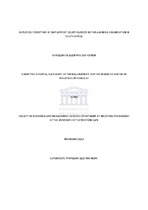| dc.contributor.advisor | Thomson, Elza | |
| dc.contributor.author | Van der Heyden, Chrizelda Colleen | |
| dc.date.accessioned | 2015-07-14T13:09:02Z | |
| dc.date.available | 2015-07-14T13:09:02Z | |
| dc.date.issued | 2013 | |
| dc.identifier.uri | http://hdl.handle.net/11394/4303 | |
| dc.description | Magister Commercii (Industrial Psychology) - MCom(IPS) | en_US |
| dc.description.abstract | After the 1994 elections South Africa had to undergo drastic changes for it to become a more just society to address past injustices experienced by various ethnic groups. Issues such as equality and social justice have frequently appeared on top of various organisations’ agenda.
The South African Government realised legislation was of paramount importance to guide organisations in promoting justice in the workplace. These changes in the legislation have had several impacts on organisations operating in South Africa, namely turnover, recruitment and retention of employees in the workplace. Attempting to preside over the promotion of social justice and eliminate inequalities experienced in the workplace, Government realised it had to intercede, not only to prevent additional discrimination, but also to promote the employment and advancement of individuals who were disadvantaged by previous policies. The Government therefore in 1998 implemented the Employment Equity Act to fulfil a constitutional mandate to prohibit discrimination in the workplace and encourage Affirmative Action (AA) measures. Describing and explaining the role of fairness as a concern in the workplace, the term organisational justice was coined. Individuals will base fairness judgements by taking into consideration the actual decision or the procedures used to reach a decision. Organisational justice can be divided into distributive, procedural and interactional justice. Organisations in South Africa face the challenge of finding ways to implement EE strategies to gain competitive advantages without creating negative employee attitudes; attention will focus on how to overcome the barriers that hinder the successful implementation of EE practices and procedures. | en_US |
| dc.language.iso | en | en_US |
| dc.publisher | University of the Western Cape | en_US |
| dc.subject | Employment equity | en_US |
| dc.subject | Fairness | en_US |
| dc.subject | Mining organisation | en_US |
| dc.title | Employees perception of employment equity fairness within a mining organisation in South Africa | en_US |
| dc.type | Thesis | en_US |
| dc.rights.holder | University of the Western Cape | en_US |

